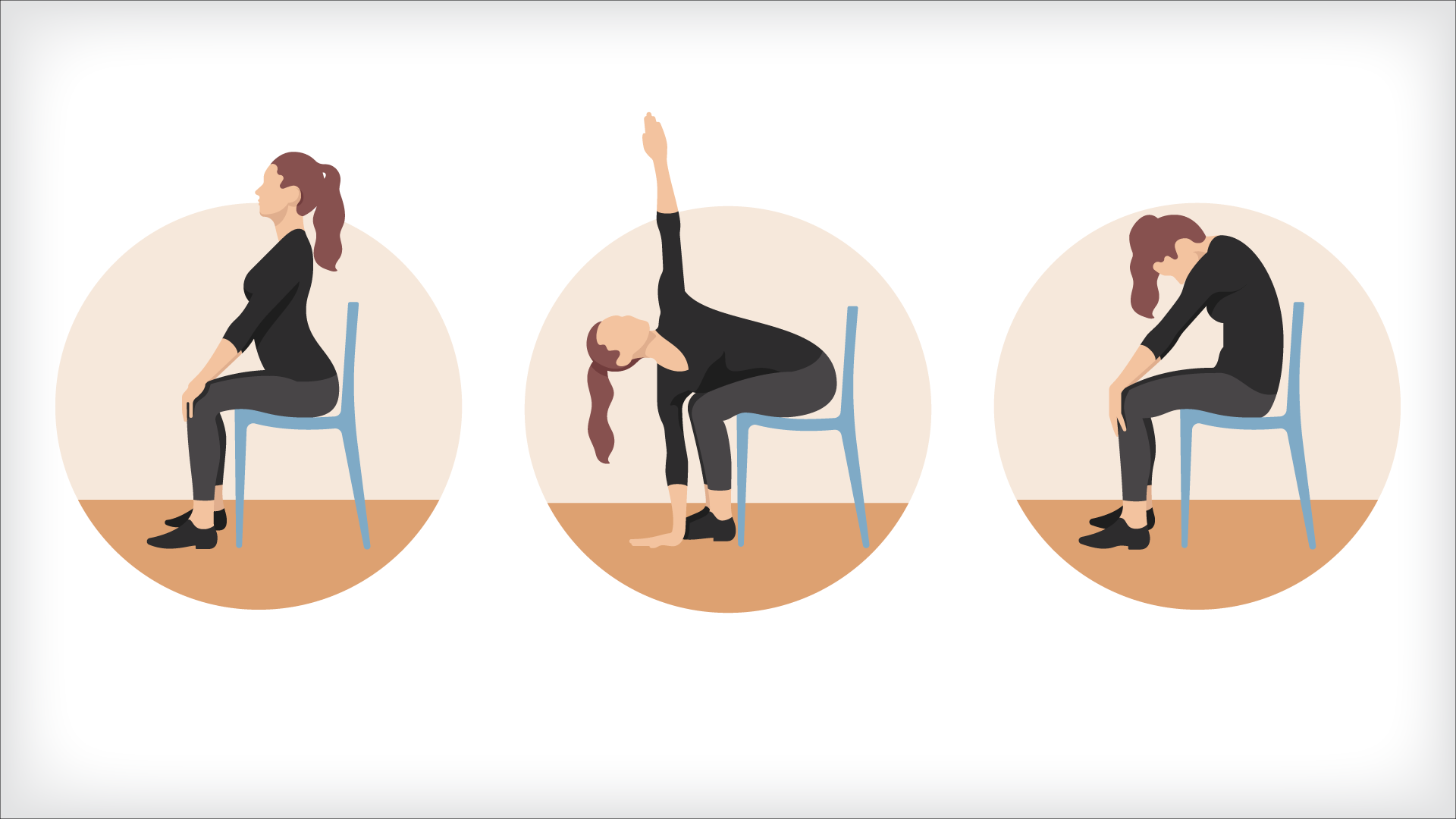
As you begin practicing yoga, you may wonder if your poses are correct. You may worry about how to do a pose, which could cause you to make mistakes. Second-guessing your abilities will only lead to discomfort and discouragement. Instead of obsessing about how your postures look, you should focus on developing a strong relationship between your body and your mind. Using these tips can help you achieve the correct poses and prevent you from feeling uncomfortable during your practice.
Arrive early to maximize the benefits of your yoga classes. It can cause anxiety to rush into a class. Many students feel anxious about their first yoga class. Being late can increase anxiety and discomfort. For this reason, it's best to arrive early. This will allow you time to settle in and use the toilet, as well as to adapt to the environment. Ask your teacher if there are any questions about how long it will last.

Get ready for your first yoga class. To ensure a spot in the class, it is important to arrive on time. Also, familiarize yourself to beginner-friendly poses. Do not eat a large meal before class as it can make your stomach feel bloated from all the movement. It is also best not to eat a large meal before class. You don’t want to cause discomfort by moving around. Talk to your doctor if you have concerns about stomach discomfort.
Respect your teacher. Your yoga instructor is there to help you correct your postures. Although hands-on instruction can be very beneficial, it is a personal practice and each student will have different goals and abilities. You can handle this by remembering to have fun and to laugh when you slip up in poses or get stuck with difficult poses. Don't be discouraged if a yoga teacher corrects your posture. It's part the process and it should be enjoyed.
Yoga classes can be overwhelming for beginners. Before you sign up for a class, find out what the most common poses are. Practice them only after you have a good understanding of the name of each one. Instead, you can view photos and look up the names of each pose. Once you are able to identify the most difficult ones, you can make a decision on which ones you will try. Once you've found the right spot for you, you can move onto the next level.

It's important to realize that yoga can be challenging, especially for beginners. You shouldn't expect to master the art overnight. It might take some time to master yoga if you're new. You're learning a new skill. So be patient. Then, you'll be able to focus on the process. Yoga instructors will teach you the skills needed to have a successful practice.
FAQ
How does mental health affect my relationships?
Your mental health affects every aspect of your life. Your ability to function at work, school, home and at school can be affected. You may also find it difficult to establish meaningful relationships because of mental health issues.
If you are dealing with a mental disorder, it can be easy to isolate yourself. You might avoid social situations or feel unworthy because no one understands.
However, it's important to remember that people want to be around you. You just have to be approachable.
Talking to others about your feelings can help you connect with them. You can tell them what you feel and ask for their help.
What can psychologists tell us about mental health?
Psychologists believe that mental well-being is an integral part of human development. They believe mental health does not simply refer to having no mental illness but also being mentally fit.
Mental health is a topic that psychologists have differing opinions on. Some psychologists think that mental health is not necessary because there are so many people who have no mental illnesses. Other psychologists think that mental health is essential because without it, we can't function properly.
How can I prevent my mental health problems from happening?
It is not easy to prevent mental health problems. But, here are some tips to keep in mind:
-
Don't drink alcohol. The effects of alcohol on moods can lead to depression.
-
Avoid using drugs. Drugs can affect your brain chemistry and make you feel worse.
-
Get enough sleep. A lack of sleep can cause anxiety and depression.
-
Exercise regularly. Exercise makes you feel happy and releases endorphins.
-
Make sure you eat healthy foods. Eating junk food can make you feel sluggish and unhappy.
-
Spend quality time spending it with loved ones. Spending quality time with the people you love can lift your mood.
-
Have fun. Enjoy your life and be open to new experiences.
-
Retire from social media. You may feel isolated or lonely on social media.
-
Be kind to yourself. Treat yourself nicely, even if you aren't feeling great.
-
Ask for help. Ask for help. Talking to a friend or family member can help.
-
It's okay for you to cry. Crying helps to relieve tension and stress. It doesn't mean anything bad happened.
-
Be busy. Try doing something you enjoy.
-
It is important to maintain good hygiene. Poor hygiene can make you feel unkempt and unattractive.
-
Stay connected. Connecting with others will help you stay positive.
-
Learn how you can relax. Relaxation techniques such as meditation and yoga can help you to cope with stress.
-
Find meaning in what you do. You can find fulfillment in your hobbies and work by finding meaning.
-
Keep your eyes on the present moment. If you can focus on the moment, you will not worry as much about the future.
-
Set goals. Set goals will motivate you to achieve them.
-
Do something nice for yourself. You can improve your self-esteem by doing something nice for you.
-
Practice gratitude. Gratitude will help you appreciate all the positive things in your life.
-
Volunteer. Volunteering can provide a rewarding way to spend time with friends and make an impact on the world.
-
Give back. Giving back to others is a way to feel fulfilled.
-
Be aware of warning signs. You should be aware of warning signs and reach out for assistance if you notice any changes.
What are some signs of mental-emotional difficulties?
Any condition that causes severe distress or impairment in functioning is considered a mental disorder. Examples of mental disorders include depression, anxiety, bipolar disorder, schizophrenia, borderline personality disorder, obsessive-compulsive disorder, post-traumatic stress disorder, eating disorders, substance abuse, and others.
What should I do when I'm experiencing mental health problems?
It is crucial to seek out help if you are struggling with any mental health issues. You may have been subjected to trauma or abuse. It is possible that you have had to deal with trauma in your past.
You may also be suffering from an eating disorder, addiction, or another type of mental illness. These disorders can cause significant damage to your personal and professional life.
You shouldn't try to deal with them on your own. Talk to someone who is familiar with the subject. These challenges can be overcome with the help of a professional therapist.
Why is mental health so important for students?
Students must be healthy mentally to be able both to concentrate on school and to do well academically. You can't do well at school if your mind isn't in the right place. Depression can lead to students missing class and poor grades. This may result in dropping out of highschool and eventually college.
Talk to your family and teachers if depression is a problem. They can help you get all the support you need.
It is important that you remember that not everyone suffering from depression needs medication. Talk therapy is effective for many people. So, if you're thinking about getting help, then you should consider seeing a counselor.
Statistics
- It does have some influence, but not nearly as much as we might think, so focusing less on attaining wealth will likely make you happier (Aknin, Norton, & Dunn, 2009); (positivepsychology.com)
- According to the National Alliance of Mental Illness (NAMI), one in five Americans experiences mental health issues which translates to more than 40 million adults a year. (doctorondemand.com)
- More than 40 million adults in the United States have an anxiety disorder, but less than 37% of people seek mental health treatment for their symptoms. (talkspace.com)
- It means no drinking any alcoholic beverages and no taking any drugs that aren't 100% natural.
- Similarly, while there is some agreement about the boundaries of typical mental disorders 2, there is likely less agreement about those for positive mental health. (ncbi.nlm.nih.gov)
External Links
How To
Why Is Mental Health Essential, And What Steps Can You Make To Improve It
Mental health is the condition of your mind and emotional well being. It affects how you feel, think, act, relate to others, sleep, eat, work, learn, play, and enjoy life.
Everyone needs to know about mental health. Mental health is often associated with depression. Depression is a serious illness that affects millions each year.
Clinical depression is also known for its severity and requires that treatment be provided by a doctor. There are many kinds of depression.
Depression is defined by the National Institute of Mental Health as "a common disorder characterised by a depressed state that lasts for most of the day," loss of interest or pleasure in almost every activity, guilt or low selfworth, disturbed sleep and appetite, poor concentration, and thoughts of suicide.
There are many ways people can feel depressed. You may feel hopeless, depressed, irritable or anxious. Others may easily feel numb, empty, restless, agitated, angry, fearful, and/or cry. Still, others may feel nothing at all.
Depression can be treated. There are many treatments for depression, including medication, psychotherapy as well as diet and lifestyle modifications that can help. Depression can lead to problems at home, school and work if it is not treated.
Depression is more common in women than it is in men, but both men and women are affected. Depression is the most common cause of disability for both men and women between 15 and 44 years old.